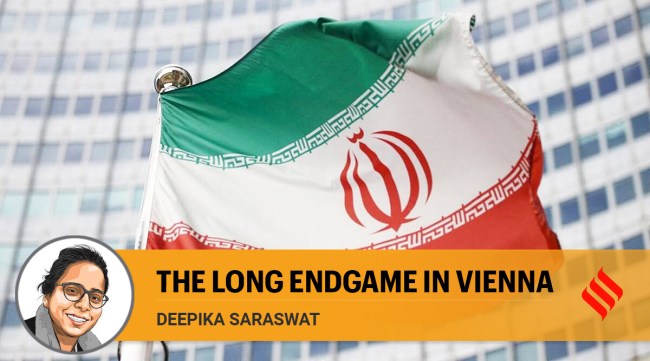Opinion In endgame of Vienna nuclear talks, Tehran holds the cards
Iran is using its growing nuclear capability to bargain an agreement with the US and the West
 Though Tehran denies seeking a nuclear bomb, its Western interlocutors are alarmed by Iran’s shrinking breakout time — the time needed for gathering enough weapons-grade uranium to make a single nuclear warhead. (Reuters/File)
Though Tehran denies seeking a nuclear bomb, its Western interlocutors are alarmed by Iran’s shrinking breakout time — the time needed for gathering enough weapons-grade uranium to make a single nuclear warhead. (Reuters/File) Iran’s foreign minister Hossein Amir-Abdollahian, during his recent visit to Syria, noted that Iran and the major powers, who have been negotiating a mutual return to the Iran nuclear deal — or the Joint Comprehensive Plan of Action (JCPOA) — over the last eleven months, were closer to an agreement “than ever before”. If the US behaves realistically, Iran is ready to finalise the agreement in the presence of foreign ministers, he said. Amir-Abdollahian’s optimistic remarks came after the talks in Vienna paused on March 11 following Russia’s demands for written guarantees from the US that the sanctions imposed on Moscow over the Ukraine crisis will not harm its economic and military-technical cooperation with Iran. It was only after Amir-Abdollahian and Qatar’s foreign minister visited Moscow in quick succession that Russia retracted its obstructionist stance by accepting guarantees on protecting the Russian involvement in Iran’s sole nuclear energy plant in Bushehr. Moscow, given its involvement in Iran’s civil nuclear programme, has a crucial role in implementing the nuclear commitment aspect of the JCPOA, namely the shipping of Iran’s excess enriched uranium stockpile to Russia and providing 20 per cent enriched uranium for the Tehran Research Reactor. Tehran was therefore careful not to criticise the Russian move; instead, it maintained that the West needs to make “political decisions” about the remaining issues.
The ongoing eighth round of talks between Iran and P4+1, with the EU coordinator of the joint commission Enrique Mora playing the intermediary between the US and Iranian delegations, has been going on since December 27, 2021, except for routine breaks for political consultations with capitals. On February 23, when the European negotiators were leaving for their capital after two weeks of negotiations, they had signalled that the talks were in the endgame as only a “few difficult issues” remained. These issues are understood to be Tehran’s demand for guarantees against another withdrawal in the future, the verifiable lifting of all US sanctions, and the IAEA investigation into Iran’s past nuclear activities. On the last issue, in the run-up to the IAEA Board of Governors meeting in early March, Tehran signalled a cooperative approach as Mohammad Eslami, the head of Iran’s Atomic Energy Organisation and Rafael Grossi, the IAEA director-general agreed on a three-month timeline for Iran to answer questions about possible undeclared nuclear activities and materials. On the issue of guarantees against another withdrawal, Iran is no longer demanding legal guarantees from Washington. It has made a case for the “inherent guarantees” of the JCPOA under which Iran will have the provision to swiftly scale up its nuclear activities as a retaliation measure. However, Tehran has refused to retreat from its uncompromising stance on the lifting of all US sanctions, while the Biden administration has so far been prepared to lift only those “inconsistent” with the deal. Another key sticking point, though not directly related to the nuclear deal, is Iran’s demand that President Biden reverse his predecessor’s designation of Iran’s Islamic Revolutionary Guard Corps as a Foreign Terrorist Organisation.
What is clear is that notwithstanding Moscow’s obstructionism, which was largely aimed at demonstrating that the West will still need Moscow in resolving key international issues, Iran and the US are the real players in the endgame in Vienna. Further, Tehran thinks it has the upper hand. Though Tehran denies seeking a nuclear bomb, its Western interlocutors are alarmed by Iran’s shrinking breakout time — the time needed for gathering enough weapons-grade uranium to make a single nuclear warhead. Also, they are concerned that the longer Iran stays outside the agreement, the more nuclear expertise and fissile material it will accumulate, thus making the original deal obsolete. Thus, time is of the essence for reaching an agreement that will turn the clock back on Iran’s nuclear activities. Tehran, therefore, uses its nuclear activities as a bargaining counter to seek an agreement that will best serve its interests. Recently, Iran’s atomic chief declared that the country’s nuclear programme is not tied to the negotiations and that it will mark April 9 as National Nuclear Technology Day to unveil a “Comprehensive Strategic Development Document for Nuclear Industry”. Such declarations serve the dual purpose of causing alarm in Western capitals and mobilising both elite and popular support for national technological achievements, irrespective of the economic costs borne by the people. Tehran’s strategy seems to be working as Enrique Mora, before embarking on another trip to Tehran, has affirmed that the stakes are high and the negotiation must be concluded.
This column first appeared in the print edition on March 28, 2022 under the title ‘The long endgame in Vienna’. The writer is Associate Fellow, Manohar Parrikar Institute for Defence Studies and Analyses







